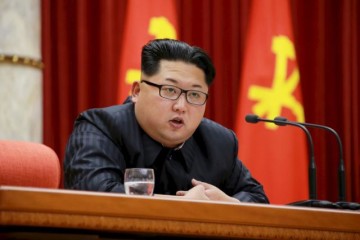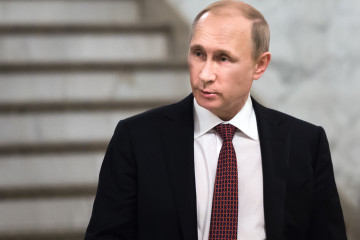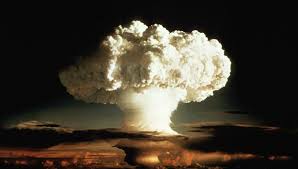U.S. Pushes Sanctions, Diplomacy as North Korea Threat Grows

(Bloomberg) —U.S. national security leaders emphasized economic sanctions and diplomacy to persuade North Korea to dismantle its nuclear weapons and ballistic missile programs, even as the Pentagon ramps up its military presence in the region with an aircraft carrier battle group and submarine.
“North Korea’s pursuit of nuclear weapons is an urgent national security threat and top foreign policy priority,” according to a joint statement Wednesday by Secretary of State Rex Tillerson, Defense Secretary James Mattis and Director of National Intelligence Dan Coats. “The United States seeks stability and the peaceful denuclearization of the Korean peninsula. We remain open to negotiations towards that goal.”
The statement followed warnings by the Pentagon’s top commander in the Pacific that Pyongyang is making steady progress toward developing ballistic missiles that can hit the U.S. Kim Jong Un’s regime is testing those missiles and nuclear devices with growing frequency and aggressiveness, Admiral Harry Harris said in testimony Wednesday before the House Armed Services Committee.
“The words and actions of North Korea threaten the U.S. homeland and that of our allies in South Korea and Japan,” Harris said in his prepared testimony. The U.S. “must be prepared to fight” on short notice, he said.
North Korea is high on the Trump administration’s agenda this week and has been a key topic of discussion between the president and Chinese leader Xi Jinping this month. Following Harris’s testimony on Wednesday, President Donald Trump stopped by a White House briefing to which the entire Senate was invited. While Trump has urged China to help rein in the North Korean regime, he’s vowed the U.S. will stop the country’s weapons program with or without Beijing’s help.
Lawmakers’ Reaction
“The military is obviously planning for a number of contingencies, a number of options, as well they should, running the full range from a more minimal military action to a far more significant military action,” Texas Republican Senator Ted Cruz said after the White House briefing. “It is the hope of the administration, the hope of Congress, that military action does not prove necessary, that economic and diplomatic pressure will cause a change in behavior of the regime.”
Democratic Senator Chris Coons of Delaware called the White House briefing “sobering,” adding that the North Korean threat “should be the top priority of the administration.”
Senator Cory Gardner, a Colorado Republican, told reporters a military strike should be well down the administration’s list of alternatives.
“There’re so many options that we need to be taking that are a long ways away from a strike,” he said. Gardner said diplomatic steps should include “secondary sanctions on Chinese individuals, entities and companies that are doing business with the North Korean regime.”
The U.S. is working with allies in Asia to further isolate North Korea economically and block imports used in its nuclear program, according to a Trump administration official who briefed reporters Wednesday. Many components of military equipment come from outside the country, and even the tires on vehicles in North Korea’s military parades are imported, according to the official, who spoke on condition of anonymity.
New Legislation
House Foreign Affairs Chairman Ed Royce said that Congress would pursue legislation to crack down on financial institutions that have ties to the North Korean government.
“There is additional legislation which we are going to move very quickly that will also choke off some of the hard currency that this regime uses for its nuclear program,” the California Republican said after attending a separate administration briefing on North Korea for House members.
But Representative Brad Sherman, a Democrat from California who serves on the House Foreign Affairs Committee, said the Trump administration isn’t applying enough pressure on China to use its influence to rein in North Korea.
“What was lost in the discussion is that they are unwilling to do anything that would put real pressure or China or use our ability to impose tariffs,” Sherman told reporters Wednesday. “Because these are things that Wall Street would reject.”
Tillerson is heading to New York on Friday to chair a session on North Korea at the United Nations Security Council.
While the joint statement emphasized diplomacy, the U.S. continued to move a battle group led by an aircraft carrier, the USS Carl Vinson, toward the region. At the same time, the USS Michigan, a nuclear-powered submarine capable of carrying 154 Tomahawks, arrived at the South Korean port of Busan this week. The move was was described by the Pentagon, which typically doesn’t discuss submarine movements, as part of a routine patrol.
Pressed by lawmakers, Admiral Harris wouldn’t discuss publicly scenarios for a pre-emptive strike against North Korea, though he did address the risk that U.S. action could be met by a response that would kill many South Koreans, Japanese and U.S. troops in the region.
“A lot more Koreans and Japanese and Americans die” if Kim’s regime reaches its nuclear arms goals, Harris said.
China has also sought to calm tensions on the Korean Peninsula by emphasizing diplomacy. Speaking by phone with Trump on Monday, Xi urged all parties to avoid actions that might make the situation worse, and to work within the framework of UN Security Council resolutions, according to state broadcaster China Central Television.
The Global Times, a Chinese Communist Party-affiliated newspaper known for its nationalist views, said North Korea stands to lose the most in a conflict.
“The game of chicken between Washington and Pyongyang has come to a breaking point,” the newspaper wrote in an editorial published Tuesday.
Amid the heightened tensions, U.S. forces have begun installing a more advanced system for tracking and intercepting ballistic missiles than South Korea’s current network of shorter-range Patriot batteries can hit. The Terminal High Altitude Area Defense system, known as Thaad, should be operational by the end of the year, according to South Korea’s defense ministry. American forces are working with Korea to complete the deployment “as soon as feasible,” the U.S. Defense Department said in an emailed statement.
South Korean Election
The introduction of Thaad has angered China, which is concerned it could be used to spy on its own facilities. The anti-missile system also has become a campaign issue ahead of South Korea’s May 9 presidential election, with frontrunner Moon Jae-in denouncing the expedited deployment while his closest rival Ahn Cheol-soo says it must take place.
In his testimony, Harris also endorsed Trump administration statements that the U.S. goal isn’t to topple Kim’s regime. “We want to bring Kim Jong Un to his senses, not to his knees,” he said.
–With assistance from Kanga Kong, Jennifer Jacobs, Toluse Olorunnipa, Laura Litvan and Tony Capaccio.To contact the reporters on this story: Nick Wadhams in Washington at nwadhams@bloomberg.net ;Steven T. Dennis in Washington at sdennis17@bloomberg.net ;Terrence Dopp in Washington at tdopp@bloomberg.net To contact the editors responsible for this story: Bill Faries at wfaries@bloomberg.net Kevin Whitelaw, John Voskuhl







No Comment